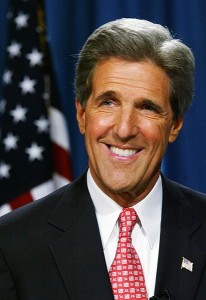Cross-posted from Consortium News

On Feb. 1, 2013, when John Kerry replaced Hillary Clinton as Secretary of State, there might have been some reason to hope that the former Vietnam veteran against the war -- and the man who conducted serious investigations of U.S. national security crimes in the 1980s -- would bring some integrity and maturity to U.S. foreign policy, especially the need to avoid exaggerations and deceptions in pursuit of American interests.
After all, Kerry personally experienced the horrors of a war fought on false pretenses as a young Navy officer patrolling the rivers of South Vietnam. After winning the Silver Star, he returned home from the war and spoke eloquently against it, making his first significant mark as a public figure.
But Kerry soon learned there was a political price to pay for courage and honesty. For his efforts to get at hard truths, such as Reagan's tolerance for cocaine smugglers in his beloved Nicaraguan Contra operation, Kerry was targeted by the right-wing press, especially The Washington Times, but also by smug mainstream outlets. For his investigative efforts, Newsweek's Conventional Wisdom Watch dubbed Kerry a "randy conspiracy buff." [For details, see Robert Parry's Secrecy & Privilege.]
So, when Kerry was eyeing a run for the White House in 2002, his political handlers persuaded him to vote to give President George W. Bush the authority to invade Iraq. And, after Kerry won the Democratic nomination in 2004, he chose to airbrush out of his resume all his honorable actions against the Vietnam War and in standing up to Reagan's crimes. When he accepted the nomination, he snapped off a corny salute and declared, "reporting for duty."
After losing to Bush -- partly because Kerry shied away from confronting the ugly smears against his war record, including Republicans passing out "Purple Heart Band-Aids" to mock his war wounds -- Kerry retreated back to the Senate where he repackaged himself as a bipartisan figure who cultivated Republican friends, such as neocon Sen. John McCain, a fellow Vietnam vet and -- after 2008 -- another failed nominee for President.
Which Kerry?
So, it wasn't clear which John Kerry would be "reporting for duty" when he got his "dream job" as Secretary of State. Would we see a return of the brave and honest John Kerry of the 1970s and 1980s, or would it be the political weather vane that swung to the prevailing winds as we saw since the 1990s?
When Kerry took over at Foggy Bottom, there was a desperate need for adult supervision of U.S. diplomacy globally. President Barack Obama's disastrous decision to staff much of his national security team with "a team of rivals" -- including Bush holdover Robert Gates at Defense, Hillary Clinton (a neocon-lite) at State and military officers like neocon-favorite Gen. David Petraeus -- meant that U.S. foreign policy deviated little from the broad outlines of Bush's neocon interventionism.
Though some of the big-name neocons had left government to work at influential think tanks or write op-ed articles for the Washington Post, there was a substantial stay-behind force, especially at State where Hillary Clinton shielded them and even promoted some, like Victoria Nuland who became department spokesperson.
The rhetoric changed a bit. The phrase "war on terror" was "out," but much of its substance remained "in," including drone killings. There was also a subtle change in how to justify "regime change" wars. It would be "democracy promotion" and "responsibility to protect," not "preemptive wars" and claims about WMD.
Indeed, perhaps the most significant evolution in U.S. foreign policy in Obama's first term was the merger between the neocons and the liberal "humanitarian" interventionists. In effect, the ever-skillful neocons forged an alliance with these liberal hawks, the likes of Samantha Power and Susan Rice who were key advisers to Obama.
The chief tactical change was to rely on U.S.-funded "non-governmental organizations" to stir up disruptive protests against a target government. Then, when security forces struck back -- often clumsily and even brutally -- the "regime changers" could assert a "responsibility to protect" or "R2P."
The new battlefield of this global propaganda warfare would be the release of YouTube videos showing (or purporting to show) atrocities committed by some embattled government against "innocent civilians." The competition was to make these videos "go viral" and stir up emotional reactions that would prompt demands from average people to "do something."
Hawkish Clinton
Clinton's State Department had been unapologetically hawkish. In 2009, Clinton joined with Gates and Petraeus to mousetrap Obama into a "surge" of 30,000 troops for Afghanistan, in what turned out to be a pointless "counterinsurgency" campaign that got about 1,000 more U.S. troops killed without changing the conflict's strategic arc toward failure.
In 2009-2010, Clinton also joined in ratcheting up the confrontation with Iran in line with the interests of Israel and the neocons. Clinton's aggressiveness was encouraged, in part, by her State Department secretly engineering the elevation of Japanese diplomat Yukiya Amano to head the International Atomic Energy Agency. The malleable Amano was in the U.S. government's back pocket, ready to be pulled out as necessary to "prove" Iran's bad faith regarding its nuclear program.
(Note: You can view every article as one long page if you sign up as an Advocate Member, or higher).





